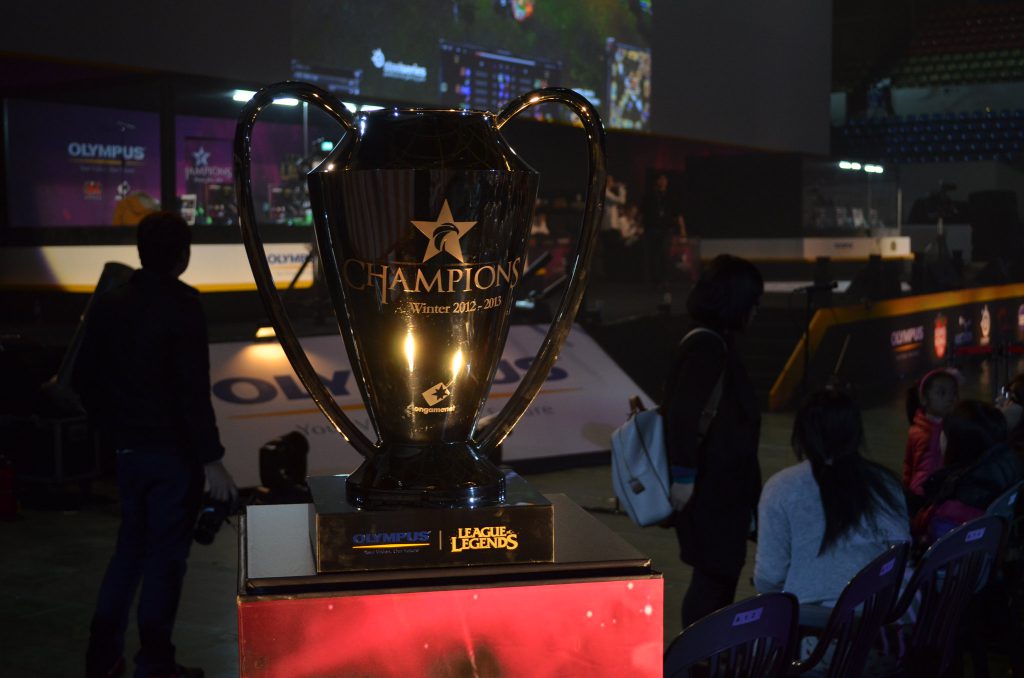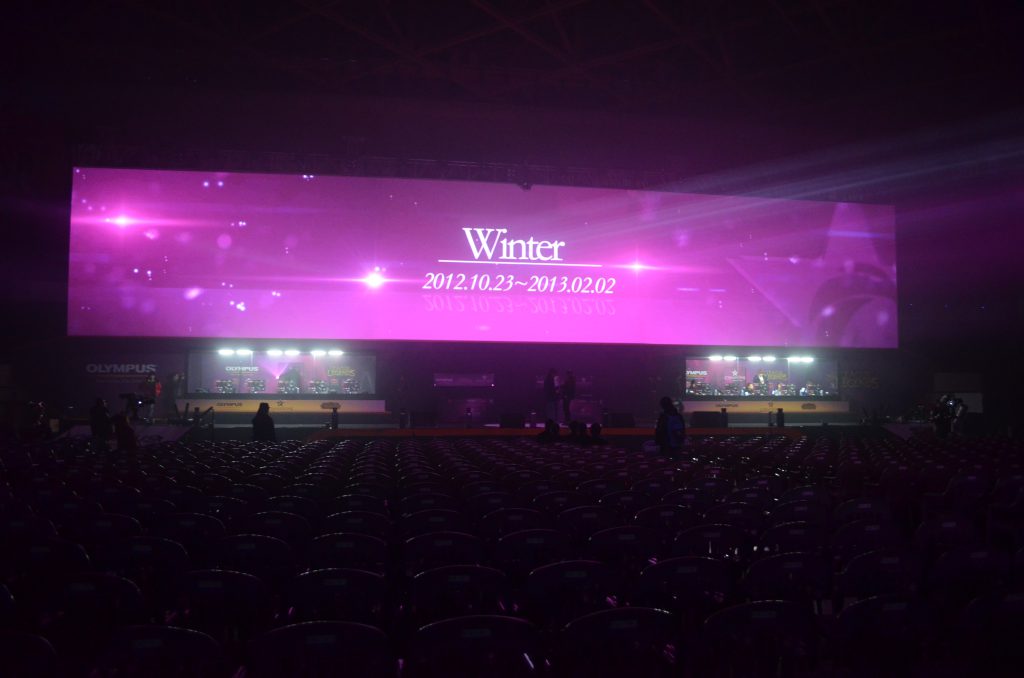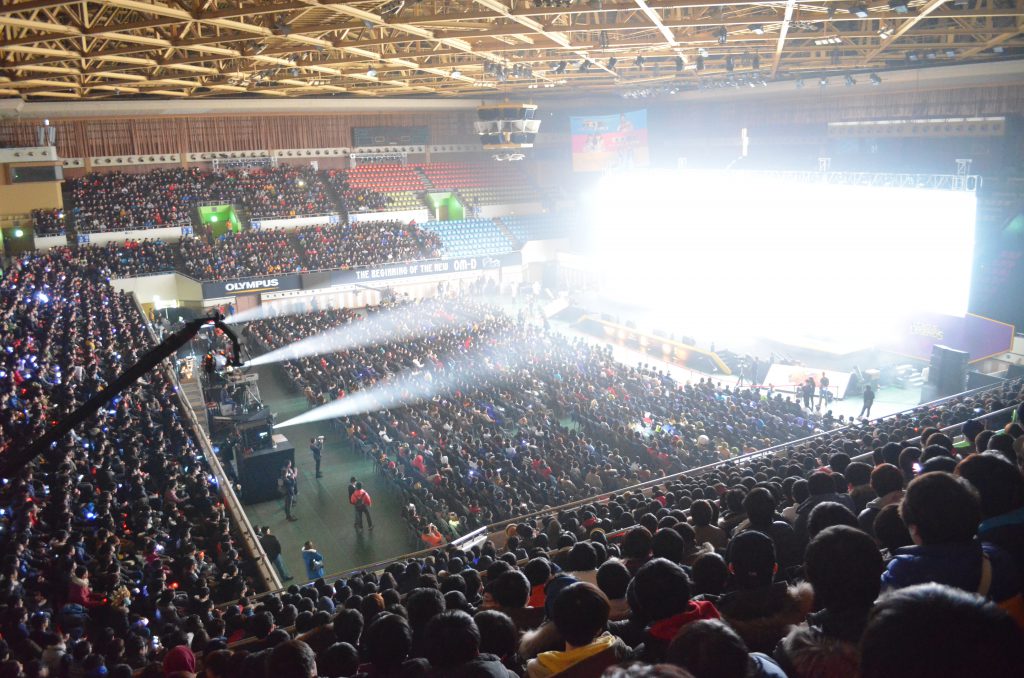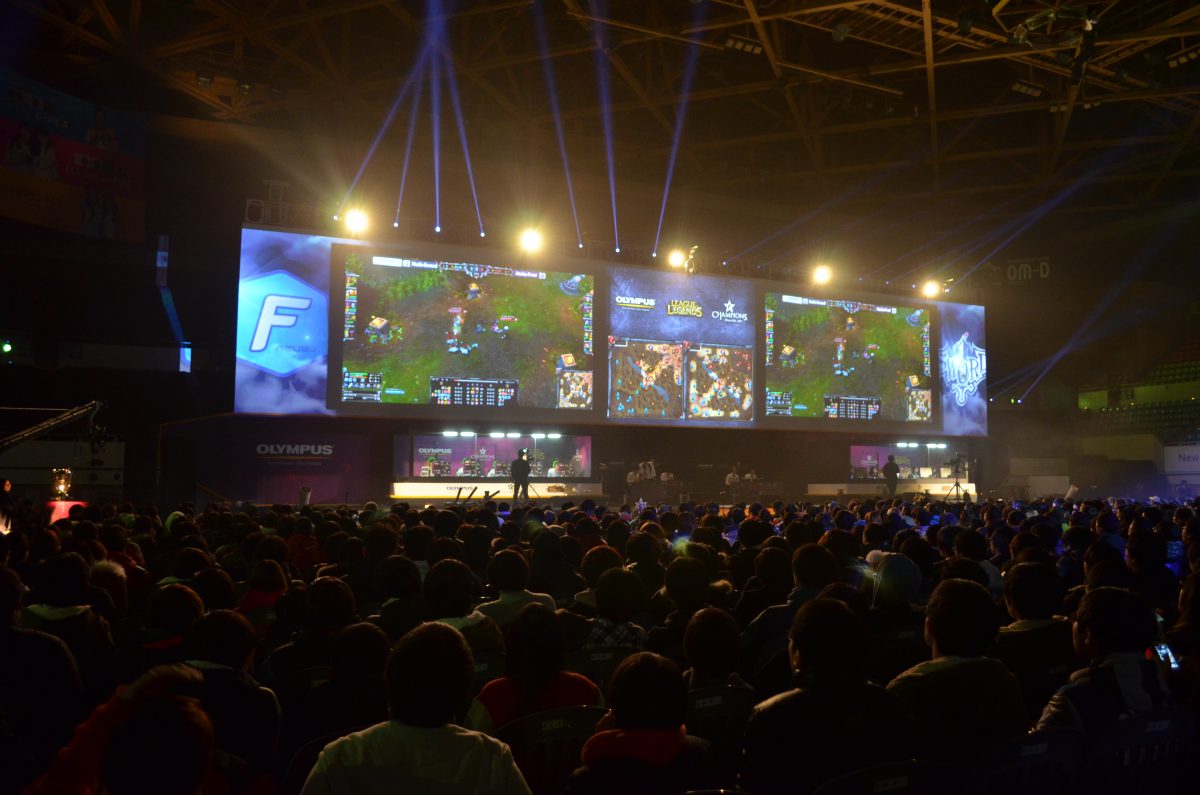Hell is being trapped in a window seat on a fifteen hour flight to Korea with a full bladder and the Canadian need to be polite. My legs crumple into the seat in front of me, two sleeping Korean men prevents me from the freedom of the aisle.
The last five days had been hectic: I received a press pass to cover the OnGameNet OLYMPUS Champions Winter grand final in Seoul, South Korea, then spent the time in between frantically preparing to leave my time zone for the first time. Despite writing about competitive League of Legends for six months at this point, Champions Winter was my first live tournament; after watching numerous American and European events from my Toronto bedroom via stream, I couldn’t help but feel a bit nauseous from my nerves. Or maybe that was the in-flight beverages.
For many eSports fans, Korea is the holy grail of professional gaming. Although it has piqued considerable interest both stateside and in Europe, Asian fans have been able to enjoy their favorite players compete for salaries, prizes and superstardom for almost a decade. OnGameNet – often abbreviated OGN – has hosted several seasons of StarCraft and branched into League of Legends after its swell in popularity, going so far to furnish a studio that enabled fans to watch competitors free of charge. While OGN’s live show operated on a first-come, first-serve basis, this event offered a notable departure with the introduction of paid tickets: OGN felt it wasn’t fair that fans who had paying jobs would be unable to line up for the hours needed to secure space.
The venue, Hanyang University’s gymnasium, was built to house volleyball during Seoul’s hosting of the summer Olympics in 1988. Two days after my arrival, the gym was converted to allow 8,000 eSports fans watch two powerhouse teams – NaJin Sword and Azubu Frost – compete for an ₩ 80,000,000 (~$73,556 USD) grand prize. This was a culmination of a season beginning in November, with Champions Spring and Summer to follow in 2013; like many other conventional sports, teams experience a regular season of group play before seeding into a playoff for the grand prize.

Up until recently, League of Legends eSports has followed a different format in America, largely due to the lack of infrastructure in place to support the same level of play. Points earned at tournaments held at conventions like Major League Gaming or Penny Arcade eXpo, determined a leaderboard, with the line between a professional, financially stable athlete and an amateur clearly drawn. While this has changed recently with the introduction of Riot Games’ League Championship series – offering salaries to players and weekly, organized league play to spectate – Korea has been doing it much longer, and constructed enough of a business in the process to sustain eSports as both a viable hobby and a career path to hopefuls who want to compete.
Until the LCS, players unable to win tournaments to sustain their career needed to split time between playing and earning a living. Sadly, this led to the creation of teams with the ability to practice dominating those without, stagnating competition in the process. In Seoul and other parts of Asia, players live together in team houses, have enough money to sustain themselves and have a social status nearing that of sex symbols. The existence of these highly competitive teams account for the dominance of Asian countries at these tournaments.
Travelling to Korea was a unique experience: not only did I not speak a word of Korean, but aside from the occasional family vacation to Florida and solo jaunt to New York City, I’d never really left home. Like an amateur, I failed to get my International roaming package working after emerging from the Seoul subway from the airport. I was at the right stop, but I was stuck in the misting rain with no idea where to go, and no tools to help get me there.
Despite my technological disconnect, I noticed that Seoul is an extremely modern city. The subways have signage in both English and Hangul, making travelling extremely easy for foreigners other services also seem geared towards travelers, including a mapping service that helps you find your station and calculate your fares, printing out a rechargeable card. There is full cellphone reception and wireless internet on the subway, but I was unable to use it: a Korean mobile number is usually needed to access free options or the possibility of purchasing.
This emphasis on mobility reflects a general acceptance of technology as a facet of everyday life. While my grandmother can barely use a prepaid flip-phone back home, there were numerous elderly playing games on touchscreens – and as I was informed later, often with each other. This worked to my advantage, as after I found some friendly Wi-Fi (ironically at one of the only Canadian restaurants in Seoul), I contacted my host for the weekend.

Christopher “Montecristo” Mykles (that’s him, on the left) has been working in eSports for nearly a decade, managing a Warcraft III team and commentating on League of Legends. Currently, he works for OGN as an English-speaking commentator for their broadcasts, and along with William “Chobra” Cho, was my connections to the inner workings of the broadcast. I worked with both men in the past on a volunteer basis for a community news site; their involvement in the scene landed them jobs in Korea as OGN expanded their audience worldwide. Cho is an extremely valuable asset in eSports due to his ability to speak both English and Korean fluently; due to his status as Press Coordinator for the event and my inability to speak the language, I largely relied on him for translations.
However, with a day still to go between my arrival and the tournament, Mykles and I spent time preparing for the upcoming event. While maintaining a physical presence in Seoul, he continued to commentate for an online stream in the United States, powering through the time difference; while lacking the spectacle of an offline event, playing and commentating online is often how players and personalities gain experience. While performance well could lead to invitations to live play, English-speaking audiences are only starting to see a regular League format with the production values of “real” sports.
Mykles and Cho’s apartment was located in Itaewon, one of the more international-friendly areas in Seoul. Between mandatory Korean barbeque, we picked up Caribbean chicken and odd takes on hamburgers, and fried, sugared pastries identical to the ones my Ukranian grandmother used to make for me. The mash up of cultures let me ease my way into my new surroundings while still having recognizable elements to latch on to, though hearing a cover band butcher a Nickelback song triggered a large amount of Canadian shame.

On the day of the tournament, those training wheels slowly came off. Despite a fairly Western-style brunch after meeting up with Mykles’ broadcast partner, stepping outside the Hanyang subway station all three of us were aware of how conspicuously foreign we looked. It was clear that fans had been congregating across the university grounds long before we got there.; we attracted our share of looks while walking to the gymnasium, and while we were able to enter, there was a little bit of waiting to be done while getting verification that we could enter.
Business infrastructure is not the only type that’s important to the Korean model of eSports; a large advantage that companies like OGN enjoy is the ease of transit for residents of Seoul. This venue, for instance had a station within a five minutes’ walk, and the OGN studio held similar advantages. For younger fans that may not have their own cars, public transit is key to minimizing investment for a night eSports. Like many sports fans in the United States can attest, it’s infinitely easier to attend a stadium/arena game without having to navigate through gridlock traffic or pay for costly parking.
The American system also works very differently in terms of frequency and spectacle; though Riot Games have their own studio in Los Angeles for League broadcasts, it currently does not host an audience. Instead, “convention” events like MLG or PAX are larger, flashier, and attendance can come with a greater degree of planning. Especially when considering travel, food and accommodations, those not living in within common cities (Los Angeles, Dallas, Raleigh, Boston) have a considerable investment to make; a tournament will often play out in its entirety over the course of a weekend, pairing League of Legends with other games to maximize the usage of a large venue. If there was any start to the spectacle of Champions Winter, it was that I was not used to seeing so much production value solely for one game.

In Korea, the passion for this one game was enthralling, as the pockets of excited fans waiting reminded me of tailgating parties I had seen back in the West. While an afternoon of going downtown to grab a baseball or hockey game seemed commonplace for those of us living near large cities, the fact that this was for video games – a hobby still struggling to find acceptance in adult audiences – was a bit surreal. After all, there was no reason why it shouldn’t be treated similarly, but I simply could not imagine telling my parents, friends, or co-workers that I was going to be sitting at home and watching a gaming tournament for most of the weekend.
Attempts in the past drew skepticism and even a little teasing: letting my parents know that I would be leaving the country for what I thought was a logical extension of sports journalism perplexed them. For all the progress that video games have made to invade mainstream audiences, the hobby still has trouble divorcing itself from the stigma it suffered for a long time prior – however, some of the most apt comparisons between the “nerd” and “jock” stereotypes point out that the latter just happen to be as passionate about baseball stats as eSports fans are about kill:death ratios.
In Korea, eSports have the benefit of seeing a more widespread audience, and therefore a better chance to normalize as part of everyday life. OnGameNet and other companies form partnerships with TV stations, allowing them to broadcast their matches as if they were any other sport. When Riot Games’ Season Two World Championship occurred this past October, the 1,154,000 unique viewer figures were considered amazing – that is, until it we found out that an additional 2,402,225 people watched the event through Korean and Chinese televisions. By normalizing the act of watching eSports, OGN’s first ticketed event was a resounding success: all 8,000 tickets for today’s tournament, priced at less than twenty dollars US, sold out in less than an hour.
While waiting for our staff and press passes, I was introduced to some familiar faces from that same World Championship; Azubu Frost, the team that eventually took second place and half a million dollars in prize money, wandered in behind us and sat down on some couches. I was caught off-guard, as my only experience with professional League of Legends players up to this point had been voice interviews through Skype and broadcast cameras at tournaments. It was hard not to be star-struck, as this was the team that steamrolled the top American squad on their way to victory. However, the feeling subsided extremely quickly as I was introduced and shook their hands. Some seemed put off by me, perhaps by my choice to wear a suit. Meeting them in person faded the view of them as unstoppable juggernauts and replaced it with the realization that these guys were, at their core, gamers. They just happened to be waiting to play the biggest game of their lives.
Eventually Frost was ushered out of the room and I was left tethered to Cho, who had taken on a jack of all trades role for Champions Winter. Translating, coordinating press and speaking on the English broadcast, we stayed with him as he ran a few errands. This paid off, though, when we stepped inside the Hanyang gym and got to see the stage.
In order to give the spectators an adequate view of the game, OGN rigged multiple projector towers along the back wall of the ground floor, shining images up onto the main screen. As the production staff went through a dry run of the lights, sound and pre-show pageantry, it was evident at how much work had been put into the establishing of a storyline for this season’s conclusion. There were recaps of the previous Spring and Summer tournaments, video packages of the teams facing off on superimposed backgrounds, and head-to-head introductions for players along with their counterpart on the opposing side. It felt like the Super Bowl, only with less pyrotechnics, combining a flash of showmanship with the competitive spirit of the championship.
Eventually, I received a press badge that gave me access to the backstage of the facility and the multiple levels of seating above the ground floor. Different utility rooms were set up in the building’s classrooms, such as locker rooms for each team and a wardrobe and makeup room. This is where I caught up with Mykles, immersed in conversation with NaJin Sword’s Yoon “MakNooN” Ha-woon; MakNooN is a favourite among foreigners due to his aggressive play, trash talk and workable grasp of the English language.
Surrounded by both teams and support staff, it was in this room where introductions were made and the naturalization between “players on a pedestal” and “normal people” were completed. Though the mood was light and sociable, I could see the determination etched into the player’s faces. For Azubu Frost, Champions Winter was a chance to become multiple-time OGN champions, and NaJin Sword was poised to usurp the throne.

Within the hour, the venue’s doors opened and people began flooding in. This process was exactly the same any other sporting event, with some of the crowd writing signs on their cellphones in hopes of being caught by the numerous boom cameras sweeping the gym. Some fans reveled in the attention of seeing themselves on-screen, while others (usually ladies) hid their faces; I found out this was partly a holdover from earlier days of eSports, where students skipping school to watch matches didn’t want to be identified.
Eventually, the crowd settled, the lights dimmed, and the production began. The light show that I witnessed earlier sprang to life, this time with a cheering crowd to give the presentation a fuller effect. Naturally, the point of all this was to hype the crowd, and it worked marvelously; you could hear random shouts of players’ names, gasps of amazement when they appeared on the screen, and the din of pure, unadulterated passion. I got to experience this from all angles while running around to get photos, and by the time I was able to slow down and watch the match itself, Azubu Frost was already down two games in a best-of-five series, facing elimination.
Leaning against a production box near one of the projection towers, I put down my camera. It was ironic that it had taken me this long to actually witness a game I enjoyed watching, because I was preoccupied with capturing others, instead. Finally settled in, the experience felt truly different from anything prior in my gaming career.
In that moment, it felt like instead of being just one person in a random spot in the crowd, I was absorbed into the game as part of a miraculous wave. Every fan in that gym was invested into the game, and when something happened during the match, the entire air changed. It would often start slow, as the most experienced eyes would catch a player out of position, or two other moving to flank him. The noise grew louder as more people caught on, swelling like the ocean before a wave’s crest; either the gambit would dissipate harmlessly, or a team would gain the advantage to thunderous applause and cheering.
It’s a pity that both teams sat in sound-proof booths on-stage: I can imagine no greater reward for a successful play.

NaJin Sword toppled Azubu Frost in that game, sweeping the match and seizing the prize money in a shower of confetti and champagne. MakNooN netted himself a check for match MVP, breaking down in tears as his team clutched the Champions Winter Cup. The closing ceremonies were emotional not only for the victors, but for the rest of the league teams in attendance; it was a nod to a successful season, not only for the players, but for OGN as well.
It was around this time that I figured out where I had felt like this before.
As a proud Canadian, I know that one of the few occasions we rally around sports is the Winter Olympic Games, where our hockey team are perennial favorites. People pause normal NHL team allegiances in favor of supporting the greater cause, where the pride of the entire country seems on the line; there was a similar feeling here despite the lack of national pride. It was every bit as intense as the Super Bowl, game seven of the World Series or the final of the World Cup; after all, it should.
This tournament was markedly different from what I had experienced because it was less of a “gaming occasion” and more of fully-developed sports event. Every person in attendance was there to watch League of Legends because he or she was deeply passionate about the teams playing and the game itself. Instead of splitting their attention between a convention around them or other games being played at the same time, they were able to invest their excitement fully towards the task at hand. Both the players and OGN were rewarded for their commitment to quality with fans that left happy, carrying the growth of eSports with them.
After requisite celebration and tying up loose ends, I was back on a plane to Toronto the next day; it was sadly a quick trip, and I would’ve loved to spend a bit more time around Seoul. Since my trip, I’ve been enjoying Riot Games’ League Championship Series on a weekly basis, but have been chasing the same level of hype that I experienced in Korea. My sleep schedule has sadly led me to miss most of Champions Spring, which will be culminating this coming weekend; neither NaJin Sword nor Azubu Frost (now named CJ Entus Frost) will be returning. It’s been nearly five months since the conclusion of Champions Winter, and that can be an eternity in an eSports fan’s memory. More teams will rise, others will fall, and the best can build legacies.
While waiting on the plane in my empty row – no fidgeting this time – the passion surrounding the championship left me hopeful that someday I could experience a tournament like that on my native soil. Something sparked inside me, as I wanted nothing more to play, watch, feel the game. Sports can inspire positive emotions, like joy, pride and camaraderie; I want gamers to be able to feel them in such an intense way, just as I had.
And with eSports’ momentum building at an immense rate, this may happen sooner, rather than later.

Leave a Reply